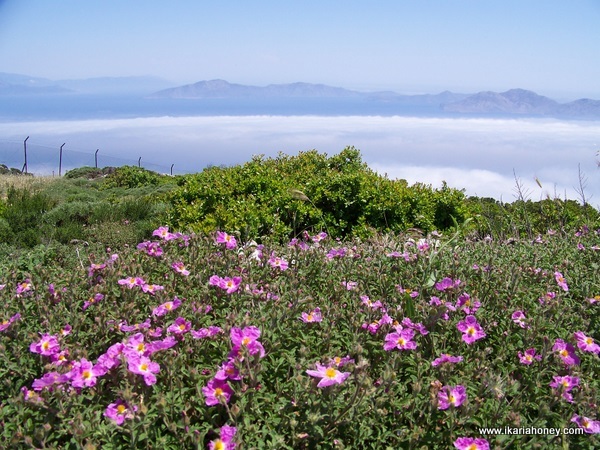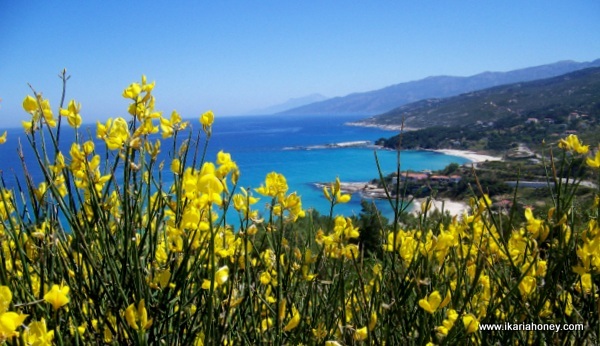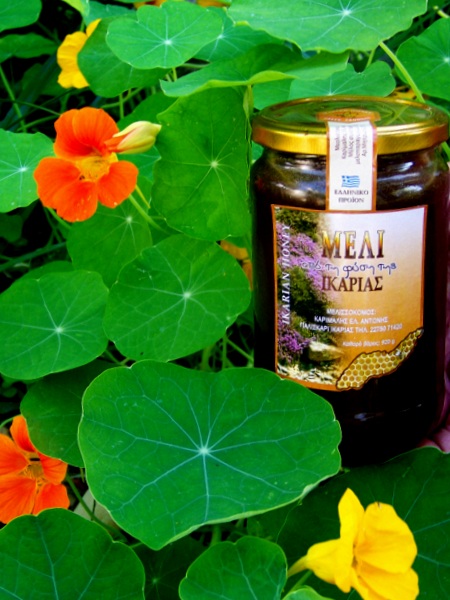Greek Islands: Ikaria
Honey from Ikaria
Honey from Ikaria
|
“Honey from the Greek island of Ikaria contains anti-cancer, anti-inflammatory and antibacterial properties,” says Dan Buettner, author of Blue Zones and The Secrets to Living a Long Life. In 2009, he brought a research team of doctors and scientists to the island of Ikaria, sponsored by BBC, National Geographic, and AARP to find why the Ikarians live so long. He came away naming Ikaria as one of the 5 “Blue Zones” in the world for longevity. NY Times had an eight page article on the wonders of Ikaria and National Geographic will feature Ikaria in the November/December 2012 issue. Ikaria, unique geographical and topographical attributes
|
|
In addition to the pristine natural setting, there is “no” industrialization or large commercial enterprise that normally produces pollutants that despoil both water and air. Because of all this, the honey gathering by the bees is undertaken in almost perfect conditions. The beekeepers Unique sources for the pollen and nectar to be gathered- The favorable environment of the island is not limited to only the factors mentioned above. There also exist a variety of unique sources for the pollen and nectar to be gathered: |
|
Spring White Heather Tree: Among these is the Spring White Heather tree. These trees are found everywhere on the island from the seaside up to the highest mountain tops (approximately 3500 foot altitude). The pollen drawn from the flowers of this tree is grey and the nectar is darker colored than that found in most honeys. The Spring White Heather is also quite hardy and grows back easily from burning fires or other adverse conditions. Greek Strawberry Tree: A second tree found on the island that contributes significantly to the honey process is the Greek Strawberry Tree. In actuality, this is a bush that grows so tall that it has erroneously been labeled as a tree and is the most rare “tree” honey. This plant produces white pollen and mostly nectar. It, too, is very strong, blooms for a short time in the fall, and can survive in a harsh environment. People come to Ikaria in search of this strawberry-tree honey, which has the most antioxidants, after learning of these findings from a study from the Univ. of Cagliari, Italy. It has a different thicker consistency and is not as sweet. Wild Lavender: A third source of food for the bees in the springtime is wild lavender. In addition to an enchanting aroma, it produces no pollen but only nectar. Fall White Heather Tree, Akoniza, pine trees, Thyme and Wild Oregano: In the fall, other sources abound for the bees to do their gathering. First, there is the Fall White Heather Tree. This differs from its spring time cousin in that it has a very strong taste and is abundant in protein. Also, it has been used for centuries to enhance fertility. Found on the island, too, is a small bush named Akoniza. It is a rich source of pollen but gives very little nectar. In the Raches area of Ikaria, Pine trees also flourish and are a constant producer of food for the bees. Numerous other wild bushes and plants abound that contribute to the special quality inherent in the honey produced on Ikaria. Amongst these are Thyme and Wild Oregano which are natural and unspoiled ground coverings that flourish amidst the landscape of the island. The taste of Thyme honey is light, delicate, sweet and tangy, usually a favor of honey lovers. |
|
All of the above gifts of nature that are found among the rugged rocks and sloping hill sides that coexist in highly forested terrain, complete with oak trees and many ancient other species that are up to 1,000 years of age, combine to make an extremely unique environment in which the bees of Ikaria live and prosper. The honey produced by the bees in this fortuitous situation is subsequently a mixture of pollens and nectars gathered from many different and rich sources. Consequently, the end result contains numerous and varied minerals and ingredients not normally found in most honey. Adding this to the “untouched by man” aspects of the honey-making process, one can easily understand why the honey made in Ikaria is of a unique and extra-special quality. We invite you to go to www.ikariahoney.com and read more and even order some Ikaria Honey so you can try it yourself. Also read my article on Greek Honey Article by Robyn Whatley |
|
| |
|
Help Support Matt's Greecetravel.com |
|

 The honey produced by the bees on Ikaria, a Greek island in the northeastern Aegean Sea, is of particularly high quality due to the unique geographical and topographical attributes found on the island. Since ancient times Ikaria has been known as the “healing island”. Ikaria is even
mentioned in Homer’s “Iliad”. Ikaria is a place that in many ways, time has forgotten. The native Ikarians do many things the same way their ancestors have done for 7,000 years. Archaeologists get all excited when they excavate a 5th century BC and later, ceramic large pottery jar used for beehives, in which the interior had been incised before firing to provide a rough surface for the bees to attach the combs. You can see these still in use in Ikaria. Ikaria has no large flat areas to speak of for cultivation
purposes and thus possesses few fields or plantations designed for food production. In consequence, the indigenous bees of the island feed off of plants, bushes, and trees that have evolved naturally without any input from man. Because of this, the pollen and nectar collected by the bees of Ikaria is 100% pure and free from any chemicals or pesticides/herbicides normally found in commercial or private farming.
The honey produced by the bees on Ikaria, a Greek island in the northeastern Aegean Sea, is of particularly high quality due to the unique geographical and topographical attributes found on the island. Since ancient times Ikaria has been known as the “healing island”. Ikaria is even
mentioned in Homer’s “Iliad”. Ikaria is a place that in many ways, time has forgotten. The native Ikarians do many things the same way their ancestors have done for 7,000 years. Archaeologists get all excited when they excavate a 5th century BC and later, ceramic large pottery jar used for beehives, in which the interior had been incised before firing to provide a rough surface for the bees to attach the combs. You can see these still in use in Ikaria. Ikaria has no large flat areas to speak of for cultivation
purposes and thus possesses few fields or plantations designed for food production. In consequence, the indigenous bees of the island feed off of plants, bushes, and trees that have evolved naturally without any input from man. Because of this, the pollen and nectar collected by the bees of Ikaria is 100% pure and free from any chemicals or pesticides/herbicides normally found in commercial or private farming. The self-sown plants are found all over Ikaria which is approximately 30 miles long and 6 miles wide. Trees and bushes blossom both in spring and fall, and thus, offer sustenance for the bees throughout the year. Again, no assistance is needed by man in order for the bees to survive
throughout the winter months.
The self-sown plants are found all over Ikaria which is approximately 30 miles long and 6 miles wide. Trees and bushes blossom both in spring and fall, and thus, offer sustenance for the bees throughout the year. Again, no assistance is needed by man in order for the bees to survive
throughout the winter months.  Summary:
Summary:
